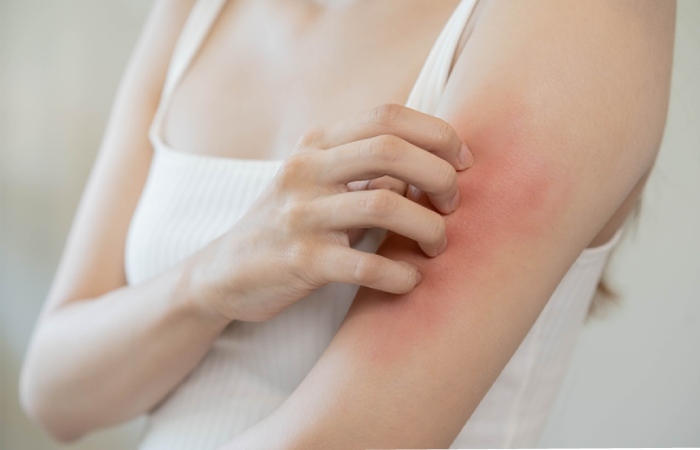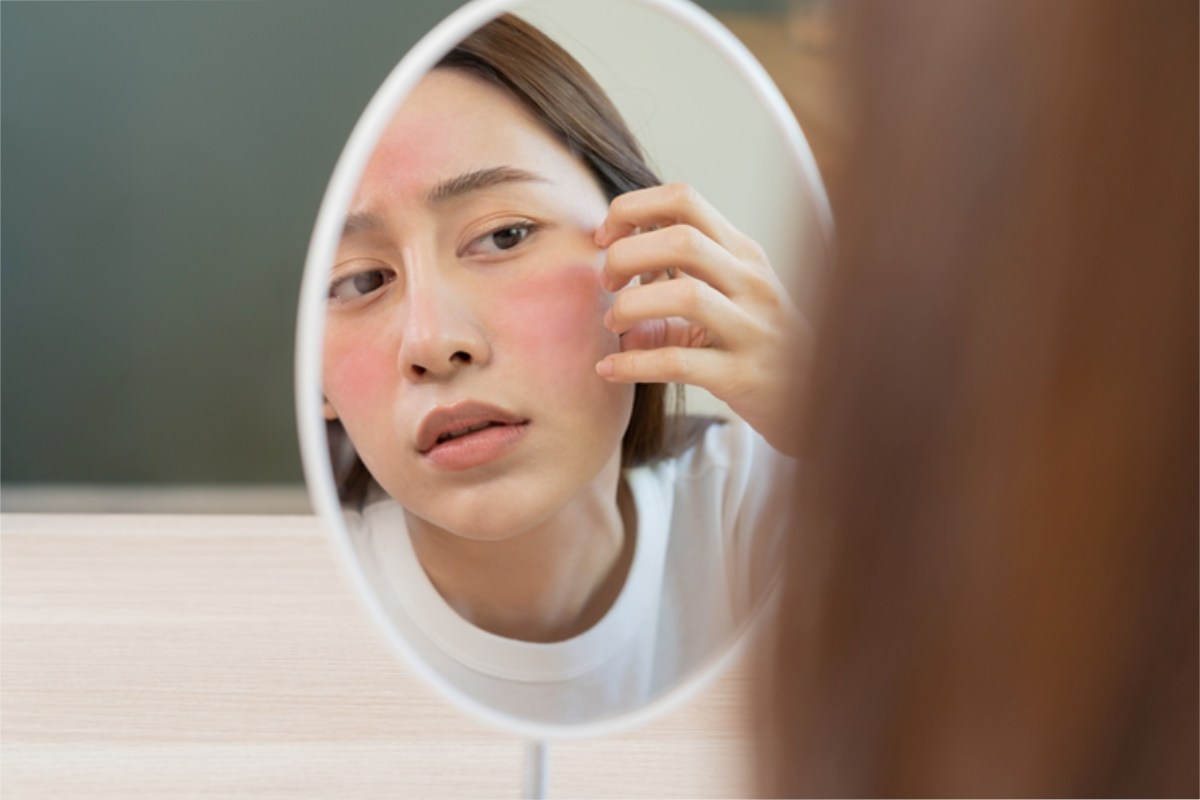14 Ways to Soothe Irritated Skin
Pretty much everyone struggles with red, irritated, inflamed skin at some point. While commonplace, irritated skin can be unsightly, itchy, and even downright painful. Thankfully, there are many home remedies that you can try to alleviate irritated skin — and there are plenty of prescription solutions, too, if your irritation persists no matter your best efforts. Here are 14 ways to soothe irritated skin, from using a soothing serum to avoiding long, hot showers:
Table of Contents
14 Ways to Soothe Irritated Skin
Stop using actives temporarily.
Exfoliating and brightening products give your complexion a boost, but the strong active ingredients they contain can sometimes irritate your skin as well. Hit pause on using these products temporarily until your skin calms down, and then slowly add them back in one at a time so you can see if they were contributing to the irritation.
Skip the fragrance for now.
We absolutely love a delicious-smelling skincare product, but unfortunately fragrance is a known skin irritant as well. Switch to fragrance-free products to stop the problem from getting worse. Also watch out for essential oils and other “natural” forms of fragrance that might not necessarily be listed as such on the label.
Simplify your skincare routine.
If you normally follow a 10-step skincare routine, it’s time to pare things back and simplify your routine. Ideally, you should be using a bare minimum of products (cleanser, moisturizer, and sunscreen) until your skin is looking and feeling better. If you have previously used a soothing serum or nourishing mask and know that it doesn’t irritate your skin, then you can incorporate those sparingly as well.
Prioritize soothing ingredients.
When selecting what products to use, look for skincare for red irritated skin that is specifically formulated to relieve irritation. Ingredients to look out for include colloidal oatmeal, aloe vera, ceramides, and centella asiatica. Also seek out moisturizing, hydrating ingredients like petrolatum, hyaluronic acid, glycerin, and peptides.
Use a gentle cleanser.
Cleansing can be one of the most drying steps of your skin routine, so it’s important to choose a gentle cleanser if your skin is already irritated. Opt for a milk or cream cleanser over a gel or foaming wash; the later tends to be more drying. Avoid cleansers that market themselves as “exfoliating” and “oil control.”
Select soothing serums.
Soothing serums aren’t required, but they can make a big difference in calming down your skin, especially if they contain ingredients that specifically target redness and irritation. Serums should be applied after cleansing and drying your skin but before applying a moisturizer since they have a thinner texture than lotion.
Moisturize your skin.
Moisturizers form a protective layer on the skin and help to prevent water from escaping the epidermis. Every time you rinse or wash the affected area, follow up with an anti-aging moisturizer that is full of soothing ingredients. Be sure to apply any topical medications such as hydrocortisone cream before applying the moisturizer.

Protect against the sun.
Sun exposure will irritate skin that is already compromised, so wearing sunscreen of at least SPF 30 is essential. Choose a mineral sunscreen vs. a chemical one; mineral sunscreens are less irritating to the skin. Cover up the irritated skin with clothing that will block the sun, and seek out shade whenever possible.
Use a cold compress.
Cold temperatures can be very soothing to red, inflamed skin. To create a cold compress, wet a soft washcloth with cold water and place it gently against the affected skin. You can also put it in the freezer first to make it even colder. For more cold therapy, use an ice pack and apply to the skin for 5-10 minutes until the swelling goes down.
Try a topical or oral medication.
If you suspect the irritation is caused by an allergic reaction, then you may find it beneficial to use a topical or oral medication, either over-the-counter or prescription strength. These medications reduce inflammation in the body and can soothe skin irritation that stems from that. If necessary, see a doctor to get a diagnosis and a prescription.
Take short, lukewarm showers.
We hate to break it to you, but hot water is extremely drying and irritating to the skin. If your skin is already compromised, then you should be showering in lukewarm or even cool water. Keep your showers short and avoid soaking in the bath. In fact, you should temporarily avoid prolonged exposure to water, such as soaking in hot tubs or swimming laps in a chlorinated pool.

Wear soft, loose fitting clothes.
If you’re mostly sitting inside (and therefore don’t need to protect your skin from sun exposure), we recommend leaving the skin uncovered when possible. That’s because fabric chafing against the skin can worsen irritation. If you must cover the affected area, choose loose clothing made of soft fabrics such as cotton so your skin can breathe.
Manage your stress.
Stress is a known contributing factor to many skin issues, including irritation, inflammation, hives, and acne. While easier said than done, managing your stress is key for calming down irritated skin. Find a stress management technique that works for you, whether it is meditation, exercising, booking a massage, or venting with your friends.
See a dermatologist.
In many cases, skin irritation will clear up on its own if you follow the steps above. However, if the irritation persists, you’ll need to set up an appointment with a dermatologist or another doctor. A medical professional will diagnose the source of your irritation and potentially prescribe topical and/or oral medications that will help clear up your symptoms.

